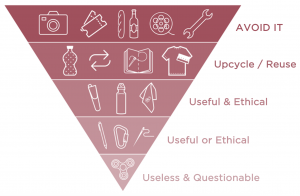The following guidelines have been adapted from Simon Fraser University’s “Sustainable Spaces: Events, Vancouver Campus” and Princeton University’s “Sustainable Event Guidelines.”
DECORATIONS
- Be creative and resourceful with natural items at your dispense. Some examples include:
- Gather fallen leaves, flowers, and branches from the outdoors to use as centerpieces and/or event decorations. Once the event is over, make sure to return all collected items to nature by putting them back where you collected them.
- Select live, non-invasive plants for centerpieces. Use them as prize draws or give them away at the end of the event to participants.
- Opt for reusable decorations and/or easily recyclable items instead of single-use plastic items.
- Some examples of reusable decorations include strings of lights, cloth banners and tablecloths. Use this paradigm for as many items as you can by replacing non-eco-friendly items with reusable items.
- Remember, for every single-use plastic item, there is a more sustainable alternative. Internet searches are your best friend!
- For affordable and eco-conscious party supplies see Eco Party Time.
- For events requiring arts and crafts materials, see Wisdom Supply Co. which offers zero waste school supplies.
GIVEAWAYS & SWAG
- Consider whether giveaways are necessary or consider using an “opt-in model.”
- Order items without dates printed on them so that they can be reused for annual events if there are leftovers.
- Reuse existing items (e.g., decorate past giveaways, screen-print past participants’ T-shirts, etc.).
- If you end up with extra giveaway items that cannot be used at a future event, consult with Ramapo Green (ramapogreen@ramapo.edu) for information about donating them or disposing of them sustainably.
- Fairware offers sustainable promotional merchandise and specializes in ethically sourced, sustainable promotional products.
A HIERARCHICAL ETHICAL GUIDE TO SWAG1


AVOID IT
Try experiences instead such as photo booths, event tickets, food, movie screenings, repair stations, and more. The options are endless!
Upcycle / Reuse
Consider options that don’t require buying new, such as decorating reusable bottles, clothing swaps, zines or book binding from reused paper, or screen printing items students already own.
If you’re going to buy new…
Useful and Ethical
If you’re going to buy new, consider products students will actually use, are durable, and come from trusted, ethical sources. We recommend checking out some of PLAN’s discounts on brands such as To-Go Ware, Klean Kanteen, People Towels, and more.
Useful or Ethical
We understand you can’t always find affordable useful and ethical swag. At least try to buy one or the other! Useful items can include durable ballpoint pens, carabiners, or sewing kits. There may be other swag options which are less useful but come from ethical sources. We recommend using these items as a last resort.
Useless and Questionable
Please avoid buying useless swag from questionable retailers. This can include items such as fidget spinners, foam fingers, slap bracelets, and so much more.
COMMUNICATIONS
- Keep the publicizing of your event strictly digital to reduce paper waste! Spread word electronically through email and social media.
- When signage is necessary, use certified sustainable and/or high-recycled-content paper.
- For recurring events, have posters include date/time/location in a way that can be easily replaced so that it can be reused next time the event is held.
- Encourage presenters to use electronic platforms (e.g., PowerPoint) instead of handouts. Where printed materials are necessary, print double sided on recycled paper with high post-consumer recycled content.
- Have event participants to type their contact information into a spreadsheet to receive electronic copies of presentations, handouts, etc.
- Plan the event with the intention to reduce the amount of materials used, or reuse materials from a previous event.
- For recurring events, make a one-time purchase of reusable banners/signage. Avoid purchasing vinyl.
- When providing name tags and lanyards, offer reusable options that can be dropped off and collected at the end of the event.
- Publicize your commitment to sustainability in outreach materials and in communications.
- Let attendees know in advance what they can do to help make the event sustainable (e.g., bringing their own water bottle or coffee mug).
- Contact ramapogreen@ramapo.edu for a “Ramapo Green” logo image or other graphics to be included in your event materials.

Ramapo College of New Jersey recognizes the value of publishing on the Internet. The College does not preview, review, censor, or control the content of these pages in any way as a matter of course. This page and Web pages linked from this page are created by the authors, and do not in any way constitute official Ramapo College of New Jersey content.



Follow Ramapo Green